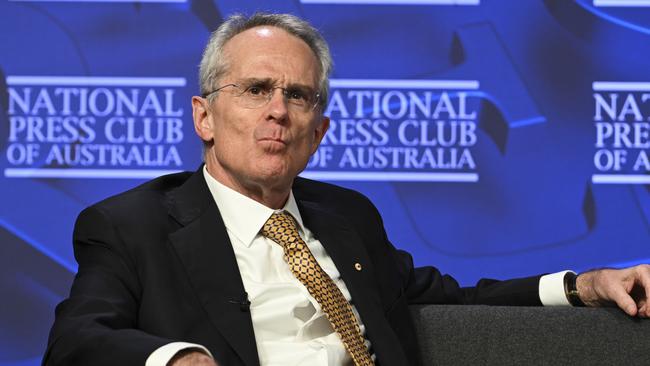Ex-ACCC boss warns ‘we all pay’ for CFMEU construction union’s bad behaviour
The one-time boss of the competition regulator, who took on the powerful construction union, says there’s a sure-fire way to crack down on wrongdoing.

Former competition boss Rod Sims says if governments are serious about curbing excessive powers of construction unions, the gaps that exist between competition laws and labour laws need to be urgently closed.
Sims, who retired as chairman of the Australian Competition and Consumer Commission two years ago, says allegations of renegade behaviour surrounding the CFMEU are “causing economic harm” and forcing construction costs to surge across the country.
The comments by the former long-serving ACCC boss comes as the CFMEU is put under the spotlight and facing a police probe in Victoria amid allegations of corruption and links with criminal elements.
Sims says regulators are often let down by inadequate laws when it comes to tackling union power. “The bigger issue is the laws did not help us address the way the CFMEU controls not only which but also how many companies could work on a construction site,” he tells The Australian. “It’s the interaction between the competition laws and the labour laws and that just makes it all really complicated.
“It really needs a good look at to sort this out”.
During his time as chairman, Sims became increasingly concerned around the damage being caused to the economy, given unions appeared to have the power to stop some builders from even bidding for large construction projects. However, he concedes, based on current laws, this can be difficult to prove.
“Our concerns were if a developer put out a tender to five builders, one or two can’t bid for the work because they not cleared by the CFMEU to work on the site.
“So our concern, was the CFMEU was allegedly controlling who could work on a site and they might be tempted to minimise the number of companies so that those companies could bid more and afford to pay higher wages.
“If our concerns were right, you are just stopping competition in the market. You’ll have prices for construction jobs that reflect the lack of competition.
“They’ll be a lot higher and that flows through the entire economy.”
Soaring construction costs “mean a whole lot of investments won’t happen or consumers ultimately pay”, he says.
While the white collar world of the ACCC seems a world away from building site battles, Sims has plenty of authority when it comes to dealing with the Construction Forestry and Maritime Employees Union.
Under his watch, the ACCC was one of the few regulators to successfully take on the militant Victorian arm of the union.
His agency won a Federal Court action against the CFMEU and its top officials, and in 2018 extracted a record $1m fine against the union for its efforts to ban concrete supplier Boral from working in building sites across Melbourne.
The union ire stemmed from Boral’s determination to work with CFMEU nemesis Grocon.
Even Sims admits the Boral case took its toll. It took four years to pursue and involved significant ACCC resources.
While the unlawful behaviour in the case seemed to be clear-cut, the complexity of the secondary boycott laws made it all the tougher to pursue.
Indeed, the ACCC was unable to secure an injunction against the union aimed at preventing a repeat of behaviour against Boral. “We were fairly determined because the behaviour was so egregious, but we had a lot of trouble getting the evidence. We just felt this was an important issue to take to court.”
Some boycott behaviour is just not captured by provisions, Sims says, adding these rules need a redraft and a clarification.
In his 2018 judgment against the CFMEU, Federal Court judge John Middleton described the union’s behaviour … was to cause a substantial loss “by deterring customers (existing or potential) from using Boral”.
“This threat was made known to certain customers, some of whom changed their supplier of concrete away from Boral,” Justice Middleton said.
The ACCC has been forced to appeal to the High Court in another boycott action involving the CFMEU. An earlier Federal Court win by it, which found the CFMEU and builder Hutchinson entered into an unlawful boycott arrangement, was overturned on appeal by the Full Federal Court. In April the ACCC, under chair Gina Cass-Gottlieb, sought leave for the High Court to rule on the case that the ACCC alleges involves anti-competitive behaviour.




To join the conversation, please log in. Don't have an account? Register
Join the conversation, you are commenting as Logout